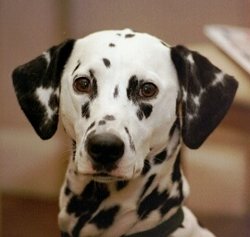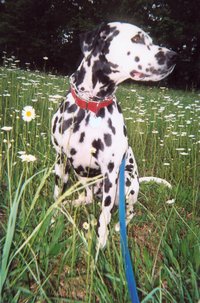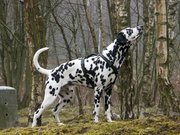
|
From Wikipedia the free encyclopedia, by MultiMedia |
| Dalmatian | ||
|---|---|---|

Black spotted Dalmatian
|
||
| Alternative names | ||
| Dalmatinac | ||
| Country of origin | ||
| Dalmatia (Croatia) | ||
| Common nicknames | ||
| Dal | ||
| Classification and breed standards | ||
| FCI: | Group 6 Section 3 #153 | |
| AKC: | Non-sporting | |
| ANKC: | Group 7 (Non-Sporting) | |
| CKC: | Group 6 - Non-Sporting Dogs | |
| KC (UK): | Utility | |
| NZKC: | Non-sporting | |
| UKC: | Companion Breeds | |
| Not recognized by any major kennel club | ||
| This breed of Dog is extinct | ||
| Notes | ||
A Dalmatian is a breed of Dog, noted for its white coat with (usually) black spots. "Liver" (brown) and "lemon" (yellow) types also exist, though they are much rarer. In the US Dalmatians are often known (and portrayed, for example in children's books), as firehouse Dogs.
This popular breed of Dog is a well-muscled, midsized Dog with superior endurance. Known for its elegance, the Dalmatian has a body type similar to the Pointer, to which it may be related. The coat is short, dense, and fine. The ground color is white with round, well-defined spots in either black or liver (brown). Lemon, orange, blue, tricolor, and brindle spots can also occur, but they are a disqualifying fault according to the breed standard. The feet are round and compact with well-arched toes. The nails are either white and/or the same color as the spots. The nose can be black or brown in liver-spotted Dogs. The eyes are brown or blue, with an intelligent expression. The ears are thin, tapering toward the tip, set fairly high and carried close to the head
Puppies are born completely white and the spots develop later.
As a result of their history as coach Dogs, the breed is very active and needs plenty of exercise. They are quite affectionate and need constant companionship or there is a risk they may become depressed. They are good with children, but because of their playfulness, they may not be well-suited for toddlers. Dalmatians are famed for their loyalty, good memories, and kindly natures.
 Dalmatian Dog
Dalmatian Dog
The Dalmatian's reputation as a firehouse Dog appears to be rooted in the popular use of the Dalmatian as a carriage Dog, that is, a Dog whose role was to run along, beside, and sometimes even under horse-drawn carriages (therefore also known as Spotted Coach-Dog). Carriage Dogs were useful for clearing the way in front of the carriage, possibly for helping to control the horses when at a full run (such as for horse-drawn fire engines), and undoubtedly because they were attractive and eye-catching. This use might have transferred to horse-drawn fire engines although it is unclear why this link is made in the US and not other countries.
However, their origins are as a generalized working Dog. They were used for so many tasks--herding sheep, hunting in a pack, and working as a retriever and as a bird Dog--that they were never specialized into one particular area.
The breed was named in the 18th century after Dalmatia.
However, it is believed to have existed for possibly centuries before it was so named:
Some Dals have a tendency towards deafness, as is the case with many mostly white or all-white Dogs. Information from Dalmatian clubs can usually address this issue for new owners. Some male Dalmatians are aggressive towards other male Dogs.
Dalmatians, like humans, apes, and guinea pigs, lack an enzyme called uricase, which breaks down uric acid. Uric acid can build up in joints and cause gout or kidney stones. These conditions are most likely to occur in middle-aged males. Owners should be careful to limit the intake of purine by not feeding these Dogs organ meats in order to reduce the likelyhood of stones.
 Dalmatian in woods.
Dalmatian in woods.
The breed experienced a massive surge in popularity caused by the 1956 novel The Hundred and One Dalmatians by Dodie Smith, and especially the Disney films based on the book. At the time of the 1996 live action film 101 Dalmatians concern was expressed that people, having seen the film, would buy the Dogs without thinking through the responsibilities of ownership: for example, Dalmatians, having been bred to run with horses, need plenty of exercise. It is not clear whether these concerns turned out to be correct, although there is evidence that problems occurred in 1961 when the first animated film, One Hundred and One Dalmatians, was released.
Dogs, made by MultiMedia | Free content and software
This guide is licensed under the GNU Free Documentation License. It uses material from the Wikipedia.